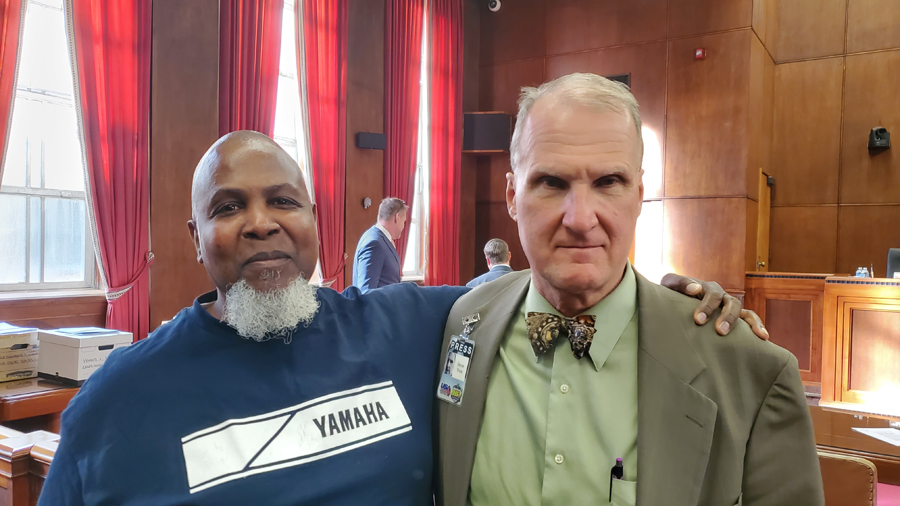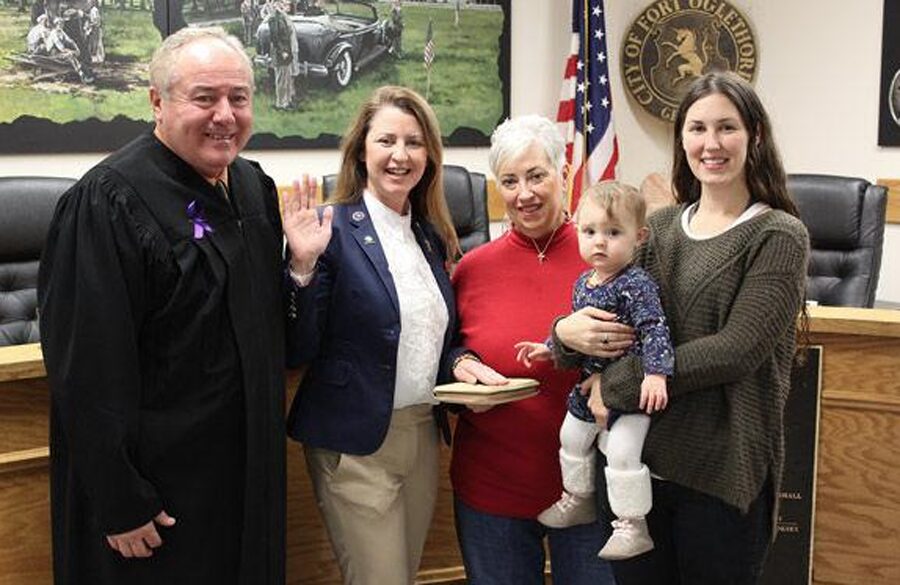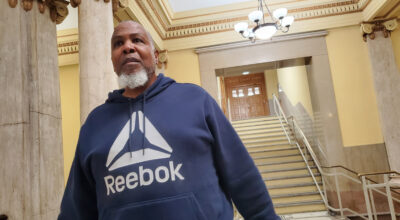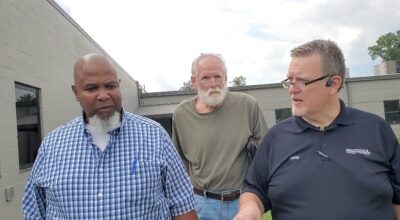 Truck driver Michael James, a rising gnome, comes to hear my oral arguments against vampire lender Flexibility Capital in the Tennessee court of appeals in Knoxville. (Photo David Tulis)
Truck driver Michael James, a rising gnome, comes to hear my oral arguments against vampire lender Flexibility Capital in the Tennessee court of appeals in Knoxville. (Photo David Tulis)
CHATTANOOGA, Tenn., Wednesday, Aug.13, 2024 — I’ve just sent to the city court of Fort Oglethorpe, Ga., a missive demanding a hearing over a judge’s no-explanation denial of my request to use a laptop to report on proceedings Thursday.
By David Tulis
City court judge Winston Webb is forcing Michael James into a “trial” into which Mr. James has not entered a plea. He refuses to enter plea because the court has no subject matter jurisdiction and because the chief witness, city cop Shandi Hall, lied on the stand about the purported “traffic stop.” The judge says in a first hearing on the seatbelt-use arrest that Mr. James cannot impeach the witness because he won’t allow negative comments against people in his courtroom.
The case is a perfect example of lawlessness now reigning in every municipal and county court across the nation. The story highlights how actors in commercial government resent anyone knowing his or her rights, and standing on them, as does Mr. James, a professional truck driver from Chattanooga.
By careful study, Mr. James liberated himself from a bogus double felony case against him in Chattanooga, which case caused him to file a 42 U.S.C. 1983 civil rights suit for damages. His false imprisonment and false arrest in that case is part of a larger story, the unjust and criminal policy on “doggie door” arrest warrants — hearsay-only arrest warrants by policy pursued by Hamilton County chief magistrate Lorrie Miller.
Objection to denial, demand for hearing
Comes now petitioner, a member of the press, and objects to the denial without reason by the court of petitioner’s request to use his laptop computer and two phones as recording devices in the court Thursday at the 3:00 PM docket for press coverage.
This petition is properly entered under the styling of the case in question, State of Georgia v. Michael B. James.
Petitioner made timely request Aug. 7, 2024, using the court system’s form “Exhibit A[;] Request to use a recording device pursuant to Rule 11 on the recording of judicial proceedings.” The court responded by e-mail Aug. 14, 2024, in the negative: “Denied.”
Petitioner has permission of the accused, Michael James, to record. The solicitor, Patrick Clements, made no objection to the court.
Petitioner objects to the lack of grounds for this denial and demands that grounds be stated in the record. He demands a hearing Thursday before the James proceedings take place so that he might defend Rule 11 and use it to make proper and timely petition, which issue the law requires be part of Fort Oglethorpe’s “official record” of the James hearing. The relevant statute preserving the integrity and honor of the court and petitioner’s federally and state constitution-protected rights is as follows.
11.7 Denial or Limitation of Recording
A properly submitted request for recording should generally be approved, but a judge may deny or limit the request as provided in Rule 11.7. A judge’s decision on a request, or on an objection to a request, is reviewable as provided by law.
(a) Denial of recording: A judge may deny a request for recording only after making specific findings on the record that there is a substantial likelihood of harm arising from one or more of the following factors, that the harm outweighs the benefit of recording to the public, and that the judge has considered more narrow restrictions on recording than a complete denial of the request:
(1) The nature of the particular proceeding at issue;
(2) The consent or objection of the parties, witnesses, or alleged victims whose testimony will be presented in the proceedings;
(3) Whether the proposed recording will promote increased public access to the courts and openness of judicial proceedings;
(4) The impact upon the integrity and dignity of the court;
(5) The impact upon the administration of the court;
(6) The impact upon due process and the truth-finding function of the judicial proceeding;
(7) Whether the proposed recording would contribute to the enhancement of or detract from the ends of justice;
(8) Any special circumstances of the parties, witnesses, alleged victims, or other participants such as the need to protect children or factors involving the safety of participants in the judicial proceeding; and
(9) Any other factors affecting the administration of justice or which the court may determine to be important under the circumstances of the case.
(b) Limitation of recording: Upon his or her own motion or upon the request of a party, witness, or alleged victim, a judge may allow recording as requested or may, only after making specific findings on the record based on the factors in the preceding paragraph, impose the least restrictive possible limitations such as an order that no recording may be made of a particular criminal defendant, civil party, witness, alleged victim, law enforcement officer, or other person, or that such person’s identity must be effectively obscured in any image or video recording, or that only an audio recording may be made of such person.
GA R UNIF MUN CT Rule 11.7 Denial or Limitation of Recording (emphasis added)

City court judge Winston Webb, left, is part of a Fort Oglethorpe swearing in of councilwoman Paula Stinnett (waving). I find not the first word about Judge Webb online, whether lawyerly and professional, or personal. (Photo Adam Cook, Walker County Messenger, Catoosa County News)
The intent of petitioner’s coverage of the James case is to promote the openness of the court, judicial integrity, and to increase public confidence in the judicial system. A Tennessee man’s prosecution – in a third hearing – in a small-town Georgia court is newsworthy
Petitioner is at a loss to guess possible grounds the court may have to deny him use of ordinary unobtrusive press equipment (laptop, cellphone). The court granted an earlier request to cover a hearing for Mr. James, with petitioner causing no disturbance as against the proceedings.
Petitioner has every intention of helping the court fulfill its duty as far as decorum goes under GA R CJC Rule 2.8
(A) Judges shall require order and decorum in proceedings over which they preside.
(B) Judges shall be patient, dignified, and courteous to litigants, jurors, witnesses, lawyers, and others with whom they deal in their official capacity, and shall require similar conduct of all persons subject to their direction and control.
Georgia rules are generous in recognizing the public’s need to record proceedings. Mr. James, as a pro se defendant, has right to make “nondisruptive” recording of proceedings after announcing at the start of them his intentions of doing so.
(a) Use of recording devices to record: Unless otherwise ordered by the court, attorneys representing parties in a proceeding and self-represented parties may make audio recordings of the proceeding in a nondisruptive manner after announcing to the court and all parties that they are doing so. Recordings made pursuant to this paragraph may be used only in litigating the case or as otherwise allowed by the court or provided by law. Attorneys and self-represented parties may also seek authorization to record proceedings pursuant to Rule 11.5.
11.4 Attorneys, Employees of Attorneys Such as Paralegals and Investigators, and Self-Represented Parties (Pro Se Litigants) (emphasis added)
Perhaps defendant plans to make a record on his wireless phone if it works. Petitioner does not rely on him or some other party to make an audio file of a proceeding he has a right to cover under the federal and Georgia constitution. He demands recognition of this right to make his own recording, with his own equipment.
“Every judge should strive to maintain the dignity appropriate to the judicial office. The judge is an arbiter of facts and law for the resolution of disputes and a highly visible symbol of government under the rule of law.” GA R CJC Preamble and Scope
Press coverage is a thing the court should be excited about. “Open courtrooms are an indispensable element of an effective and respected judicial system,” states Rule 11.1. “It is the policy of Georgia’s courts to promote access to and understanding of court proceedings not only by the participants in them but also by the general public and by news media who will report on the proceedings to the public.”

